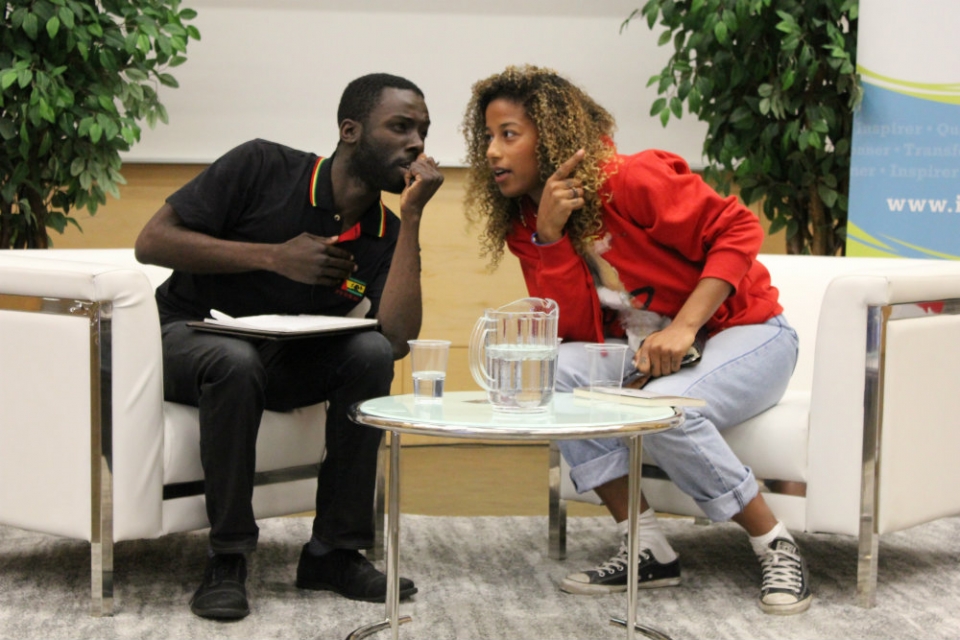The Congress of the Humanities and Social Sciences brings together leading thinkers, academics, researchers, policy-makers, and innovators to explore some of the world’s most challenging issues. Congress celebrates the vitality and quality of Canadian research contributions and helps train the next generation of Canadian ideas leadership. This year’s theme “The Next 150, on Indigenous Lands” celebrates the history, legacy, and achievements of the peoples and territories that make us who we are, and anticipates the boundless opportunities of the future. Organized by the Federation for the Humanities and Social Sciences, this year’s Congress is being hosted by Ryerson University in Toronto from May 27–June 2. Follow this series of Big Picture at #congressh blogs.
Aja Monet began the final event of Congress 2017’s Big Thinking series by reading two of her poems with overwhelming force and charisma. Her first, “Dark Matter,” was a scathing criticism of the systems of power in capitalism, value assessment, and White supremacy that keep people of colour in perpetual states of inequality. Her second, “Black Joy,” celebrated sources and moments of pure joy with vivid images rolling off her tongue so rapidly it was almost impossible to keep up, ending with the statement that “true joy has always been and will always be justice.” Audience enthusiasm was palpable, and even an infant in the audience expressed his or her approval, to which Monet quipped that, “nothing really radical’s going on without a baby in the room.”
Interviewer Desmond Cole then engaged Monet on race, justice and movement building in North America and around the world. They spoke about language, about its power as a means of cultural making, remaking, and preservation, about how language is as much how you say something as what you say. Speech for Monet is a pathway to freedom: the same skills of self-expression used in rap can open doors and empower young people. It is also a component of the performance of identity played out on the body, but the language of poetry can express the interior world that the performance of identity obscures.
Cole asked Monet questions about her activism with the Dream Defenders and the Smoke Signals Studio, the latter of which she co-founded. Monet’s work with the Dream Defenders began as part of the Black youth movement to push society forward after the 2012 murder of Trayvon Martin in Sanford, Florida, the massive protests in Ferguson, Missouri, sparked the death of Michael Brown at the hands of a police officer, and the many other examples of endemic violence perpetrated against Black people in the United States. That work took Monet to Palestine, where she met with young Palestinian activists and artists to collaborate on ways to stand up to state violence. Monet said that with corporate culture making nationalist lines of demarcation less and less relevant, oppression has become more and more unified, so we have to be unified across boundaries and borders in order to be free.
Monet co-founded the Smoke Signals Studio out of her home, and she spoke about how home for her is the first and most important safe space available to people of colour to start building a free society. It is the space where imagination can exist even in the direst of circumstances, and according to Monet there is nothing more powerful than a Black woman’s imagination. For this reason, she called on all of us to do more to foster the imaginations of our children.
It takes more than imagination, however, for Monet to survive and thrive in a world of violence against Black people and systems of White supremacy. When asked how she does it, Monet replied that it is through love—not romantic love but love of all kinds—that keeps her going. Being a lover for Monet is about doing right by yourself and others, making sure that your home is a place of love, and the love of the mundane and the everyday (food, housing, friends). Activism for her is not just about confronting the police and other tools of state violence and oppression: it is also about being of service to each other.
Internationally established poet, performance poet, singer, songwriter, educator, and human rights advocate Aja Monet was interviewed by activist, author, and award-winning freelance journalist Desmond Cole in Black Joy: Resistance, Revolution, & Radical Love, the final event of the Big Thinking lecture series at Congress 2017.

